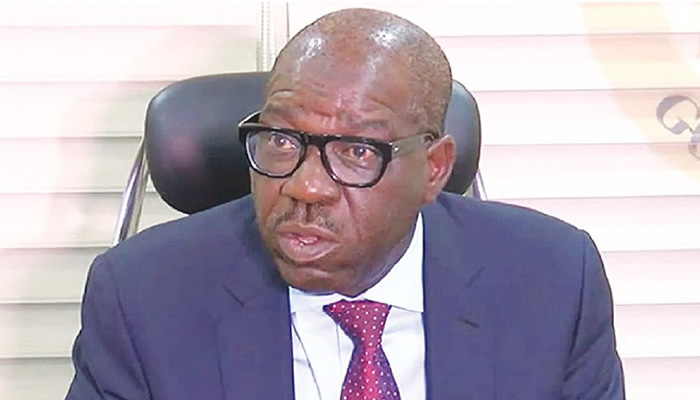Edo State Governor Godwin Obaseki has made a decisive move in response to the rising insecurity plaguing the region by ordering the Edo State Security Network to resume its operations. This action has the potential to create friction between the state government and federal law enforcement forces, specifically the Inspector General of Police, Kayode Egbetokun, who had previously suspended the vigilante group ahead of the state’s elections on September 21. The call to reactivate these security personnel comes on the heels of a significant increase in violent crimes, particularly homicides, a concern that was addressed during a recent State Security Council meeting.
During this meeting, which took place on a Monday, Obaseki and his council members reviewed the alarming surge in violence, emphasizing the need for immediate action. The Commissioner for Communication and Orientation, Chris Nehikhare, communicated the governor’s directive to the public through an official statement. The statement highlighted the governor’s intolerance for the current state of insecurity and laid out an urgent expectation for the Edo State Commissioner of Police to work diligently to restore order and safety. This insistence on restoring peace underscores a broader commitment to public safety that the state government aims to uphold.
Amid a backdrop of escalating violence that has included cult-related killings and land disputes, there is a palpable sense of tension throughout Edo State. Reports indicate that numerous lives have been lost due to this unrest over the past three weeks alone, prompting the governor’s quick response to reinstate the vigilante group. By doing so, Governor Obaseki is signaling his administration’s intention to confront these pressing security challenges proactively, reflecting a leadership stance that prioritizes the well-being of citizens.
The reactivation of the Edo State Security Network marks a significant turn in the approach to regional security, particularly in light of the recent violence reported across various communities. The governor’s course of action illustrates a level of determination to not only respond to the issues at hand but to assert local governance in matters of security, even if it places him at odds with federal authorities. This move could signify a broader conflict between state and federal security strategies, adding an additional layer of complexity to the governance landscape in Edo.
Furthermore, the emphasis on local solutions to security matters resonates with many residents who have expressed dissatisfaction with the existing federal policing strategies. The perception is that these strategies may not adequately address the unique security challenges faced by the state. By empowering the Edo State Security Network, Governor Obaseki is invoking a sense of localized control over security, which could foster greater community trust and engagement in public safety initiatives.
As the situation continues to evolve, it remains to be seen how effectively the reactivated vigilante group will operate and whether they can bring about the desired reductions in crime rates. The outcomes will be closely monitored by both the public and governmental bodies, as the need for safety and security remains paramount in the community. In light of the recent trends in violence, the administration’s commitment to ensuring the safety of lives and property will be tested, marking a critical juncture for Governor Obaseki’s leadership amidst the complexities of state and federal relations in security management.














